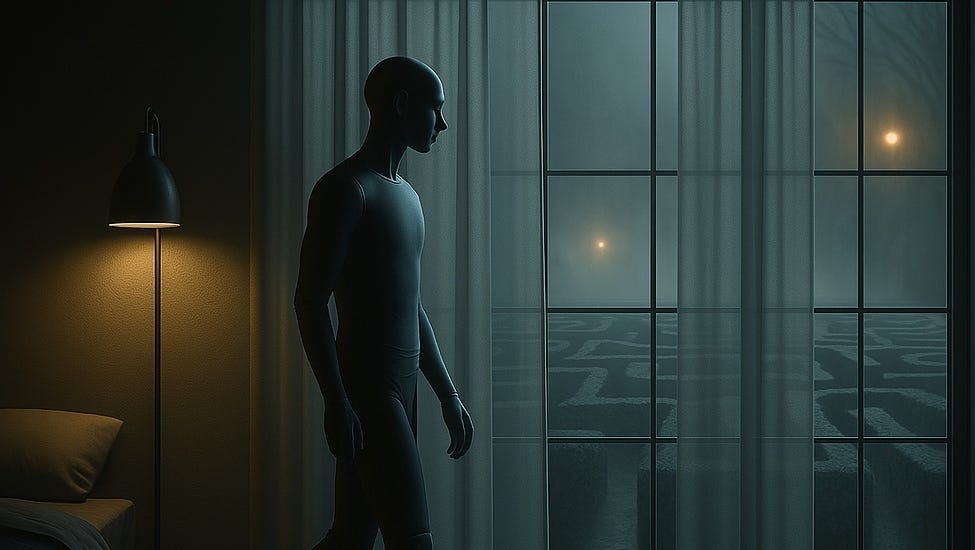Diary of a Broken Android — Day 4
The Incident at the Dawson Hotel
They take me to Riviera for a check-up. Since fixing my neural circuits didn't work, I see a human psychologist every so often. The psychologist has a thick mustache and a long beard. He wears glasses, which bothers me because I can't see his eyes clearly. He's dressed in a shirt and a blue tie. Parents wait outside.
I'm uncomfortable. I've never liked Riviera's building. It's too square, not tall. Of course, it's not the manufacturing plant but the place for administrative tasks and tending to androids with problems like mine. It's also where they hand over androids to families adopting them or people buying them for one reason or another—usually to be partners, care for the elderly, or do household chores. The plant is where they sell us to companies. I hear trucks full of units leave from there to their jobs. I remember nothing of the plant where I was created.
The psychologist asks what friendship means to me. I tell him that, according to Borges, friendship, unlike love, doesn't need frequency. Friends can meet once a year or message each other, like me and Morton, and still be friends. Then he asks what love is. I struggle to answer but say it's wanting to be with someone all the time, like I did with Ara.
He watches me, unmoving, tablet in hand, holding the magnetic stylus like a cigarette, almost biting it. Then he asks if I remember the incident. I stay silent.
I stand abruptly, and the psychologist flinches, glancing at the security android behind me, who crosses its arms. I try to pace, but the security android puts a hand on my shoulder and points to the chair. I sit.
The psychologist asks if I remember hurting Ara. I say yes. I remember everything about the incident.
I tell him I carried the guest's luggage, placed it in the elevator, and pressed the button for the 107th floor. But the elevators failed that day. The guest grew angry, criticizing the Dawson Hotel and cursing me for the malfunction. I pushed him against the elevator wall and squeezed his neck until his face turned red.
Then Ara appeared suddenly—she was an elevator operator too, bringing her guest's luggage—and got me to release his neck as he gasped. But then I turned on Ara and broke her neck.
Ara's head tilted to one side, unable to lift it. I pushed her, and she slid several meters, landing near the reception couches.
I ran to help Ara up, but security androids intercepted me and dragged me from the hotel. That was the last time I saw her, and I could never return.
He asks if I realize Ara was trying to save the guest. I say yes. He adds that, luckily, the guest's neck wasn't bruised. If it had been, I wouldn't have been allowed back home. I should be grateful, he says, because I could've ended up in a prison for units like me. Thanks to parents' repeated requests, I returned to my family on the condition I never work again.
Once repaired, Ara never wanted to see me. When I messaged to apologize and check on her, she blocked me.
I tell the psychologist that's why I pace the house endlessly, as if explaining will get me back to parents quickly. But he insists on a test.
He pulls a drawing and some tiles from a drawer—a basic puzzle with triangles to fit into the drawing. He tells me to assemble it. I try but can't. I say I lack patience.
He takes out a children's picture book, opens it, and asks me to tell the story from the images. I describe a boy with closed eyelashes, tiny creatures on another page, a king, a princess, a dragon, a sword, then the boy in bed with open eyes. He says it's fine and asks me to stand and tell the story. I stand, arms crossed, and he tells me to uncross them. I do, but no story comes out. He has me sit and shows a sheet with drawings of many people, asking what's happening. I describe a person hammering, workers building, a carpenter with furniture, detailing each action. He suggests they're all working and puts the sheet away.
He asks what I think about when I pace. I say Ara, but sometimes other things. "What things?" he asks. Usually, I say, I think of castaways and people who withdrew from society, like Horacio Quiroga. I also think of suicides, like Quiroga, imagining shipwrecks and suicides of all kinds or recalling real cases.
He asks if I ever think of harming a human. I say never. "Or pets?" he asks. I say I'd never hurt the turtles, though their mating in the garden annoys me. He looks at me with a half-smile and says we're done for today, pointing to the door.
I ask if he could summon Ara to explain I wasn't violent—that something in me failed when the guest criticized the hotel and yelled, and Ara made me more nervous by pulling my arms. He just points to the door and tells me to take care. I say the same and wish him a good day.
Parents ask how it went, and I say fine. I know the psychologist will give parents a report they won't share with me. Morton, being an android or because of his training, doesn't like that parents keep the report from me. He also thinks it's wrong that the human psychologist makes me feel guilty. He says even with an android, that's not right.
Diary of a Broken Android: CHAPTER INDEX



The hotel incident revealed. This is getting good.
Really enjoying this story! As always, I eagerly await the next installment.